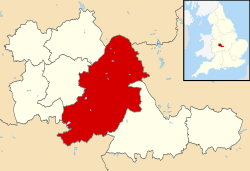Birmingham Corporation
| Birmingham |
| City and Metropolitan borough |
|
|
|
|
| Etymology: Old English Beormingahām (home or settlement of the Beormingas) |
Nickname(s):
- Brum
- Brummagem
- Second city
- City of a thousand trades
- Workshop of the world
- Venice of the north
|
| Motto: Forward |

Birmingham shown within the West Midlands county
|
Show map of England Midlands
Show map of the United Kingdom
Location of Birmingham in the United Kingdom
|
| Coordinates: 52°28′59″N 1°53′37″W / 52.48306°N 1.89361°W / 52.48306; -1.89361Coordinates: 52°28′59″N 1°53′37″W / 52.48306°N 1.89361°W / 52.48306; -1.89361
|
| Sovereign state |
 United Kingdom United Kingdom
|
| Constituent country |
 England England
|
| Region |
West Midlands |
| Ceremonial county |
 West Midlands West Midlands
|
| Historic county |
 Warwickshire Warwickshire
|
| Settlement |
c. 600 |
| Seigneurial borough |
1166 |
| Municipal borough |
1838 |
| City status |
14 January 1889 |
| Metropolitan borough |
1 April 1974 |
| Administrative HQ |
The Council House,
Victoria Square
|
| Government |
| • Type |
Metropolitan borough |
| • Body |
Birmingham City Council |
| • Leadership
|
Leader and cabinet |
| • Executive
|
Labour |
| • Leader |
John Clancy |
| • Lord Mayor
|
Carl Rice |
| • Chief Executive (Interim) |
Stella Manzie CBE
|
| Area |
| • City |
103.4 sq mi (267.8 km2) |
| • Urban |
231.2 sq mi (598.9 km2) |
| Area rank |
151st |
| Elevation |
460 ft (140 m) |
| Population (mid-2016 est.)
|
| • City |
1,124,600 |
| • Rank |
1st |
| • Density |
10,880/sq mi (4,199/km2) |
| • Urban
|
2,440,986 (3rd) |
| • Metro
|
3,683,000 (2nd) |
| Demonym(s) |
Brummie |
| Time zone |
Greenwich Mean Time (UTC+0) |
| • Summer (DST) |
British Summer Time (UTC+1) |
| Postcode |
B |
| Area code(s) |
0121 |
| ISO 3166 code |
GB-BIR |
|
GSS code |
E08000025 |
| NUTS 3 code |
UKG31 |
| ONS code |
00CN |
| OS grid reference |
SP066868 |
| Motorways |
M6
M6 Toll
M5
M42
A38(M)
|
Ethnicity
(2011 Census)
|
- 57.9% White (53.1% White British)
- 26.6% Asian
- 8.9% Black
- 4.4% Mixed Race
- 2.0% Other
|
| International airports |
Birmingham (BHX) |
| Major railway stations |
Birmingham New Street (A)
Birmingham Moor Street (B)
Birmingham Snow Hill (C1) |
| GDP |
US$ 121.1 billion (2nd) |
| - Per capita |
US$ 31,572 |
| Councillors |
120 |
| MPs |
|
| European Parliament |
West Midlands |
| Website |
www.birmingham.gov.uk |
Birmingham (,locally /ˈbɜːmɪŋ(g)əm/) is a city and metropolitan borough in the West Midlands, England standing on the small River Rea. It is the largest and most populous British city outside London, with a population of 1,101,360 in 2014.
A medium-sized market town in the medieval period, Birmingham grew to international prominence in the 18th century at the heart of the Midlands Enlightenment and subsequent Industrial Revolution, which saw the town at the forefront of worldwide advances in science, technology, and economic development, producing a series of innovations that laid many of the foundations of modern industrial society. By 1791 it was being hailed as "the first manufacturing town in the world". Birmingham's distinctive economic profile, with thousands of small workshops practising a wide variety of specialised and highly skilled trades, encouraged exceptional levels of creativity and innovation and provided a diverse and resilient economic base for industrial prosperity that was to last into the final quarter of the 20th century. Perhaps the most important invention in British history, the industrial steam engine, was invented in Birmingham. Its resulting high level of social mobility also fostered a culture of broad-based political radicalism, that under leaders from Thomas Attwood to Joseph Chamberlain was to give it a political influence unparalleled in Britain outside London, and a pivotal role in the development of British democracy. From the summer of 1940 to the spring of 1943, Birmingham was bombed heavily by the German Luftwaffe in what is known as the Birmingham Blitz. The damage done to the city's infrastructure, in addition to a deliberate policy of demolition and new building by planners, led to extensive demolition and redevelopment in subsequent decades.
...
Wikipedia












